Watermelons thrive in well-drained, sandy soil rich in organic materials. Without proper soil and fertilization, your Watermelons will not grow correctly. Feeding your Watermelons the right fertilizer type motivates them to grow bigger and juicier. If you want your vine-filled leaves and fruits to be large and robust (and grow delicious melons), you need to feed them. Use nitrogen-based fertilizer initially when fertilizing Watermelon plants. Nitrogen will help produce green vines, while potassium and phosphorus help in melon production.
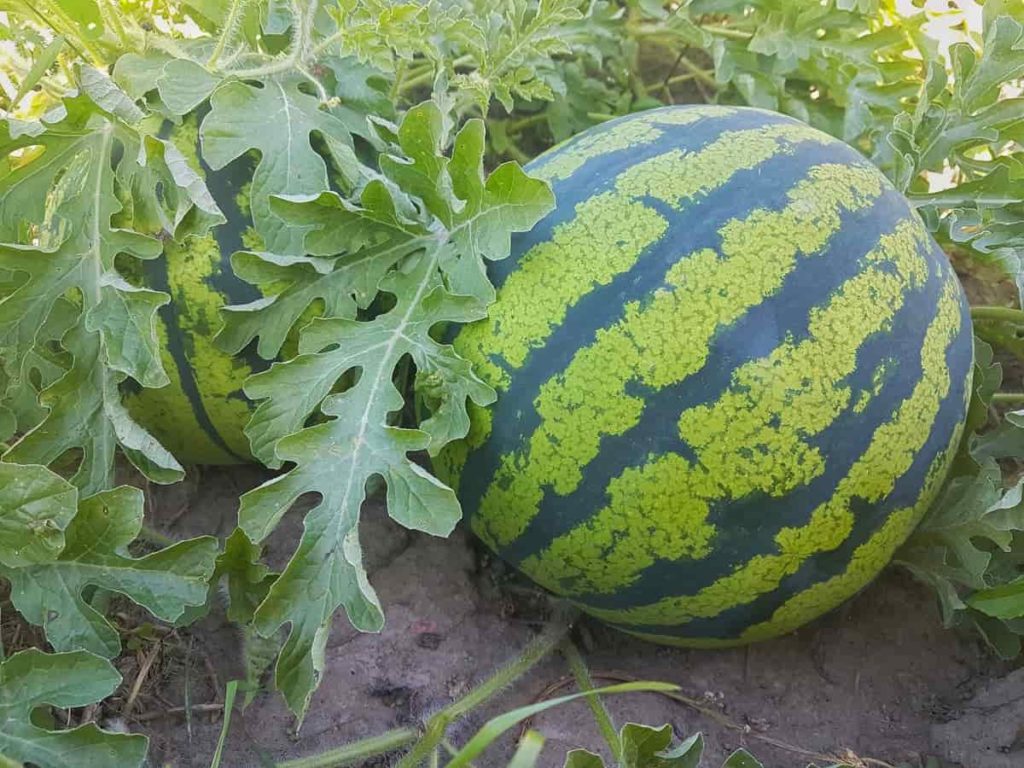
However, once the plant swells, switch the Watermelon to feed phosphorus and potassium-based fertilizer. Watermelon requires enough potassium and phosphorus for the best melon production. Understand the nutrients and ingredients in the fertilizer before adding it to the Watermelon crop. This reduces the chances of feeding more or fewer nutrients. Read the packaging label carefully to determine the NPK ratio of selected fertilizers. Let’s check out the best fertilizer for Watermelon.
The type and rate of fertilizer for Watermelon depends on the current nutrient level of soil and the stage of Watermelon growth. Therefore, the first step in preparing fertilization schedules for Watermelon should be to check the soil for nutrients and pH. Then, Watermelon should be fertilized before transplanting the young seedlings into the garden when the vines start to spread and melon begins to form fruit.
Best fertilizer for Watermelon
Homemade fertilizers for Watermelon
Coffee grounds
Coffee grounds enhance the taste of Melons. If you use Coffee grounds, you get large melons. As soon as they break, grounds will release nitrogen into the soil.
Epsom salt
Flat, tasteless melons can be due to a lack of magnesium or boron in the soil. Such fruits can be sweetened by giving them a dose of Epsom salt and borax. For home garden use, use about 6 and 1/2 tablespoons of Epsom salt and 3 and 1/2 tablespoons of borax, all included in five gallons of water.
Liquid fertilizers for Watermelon
Fish emulsion – Watermelons will be smaller and less tasty if they are stressed for water or nutrients when setting fruit. Feed Watermelon with a dilute solution of fish emulsion one tablespoon of water per gallon weekly from the time the plant is seedling until the first female flower appears.
In case you miss this: Watermelon Gardening For Beginners – How To Start
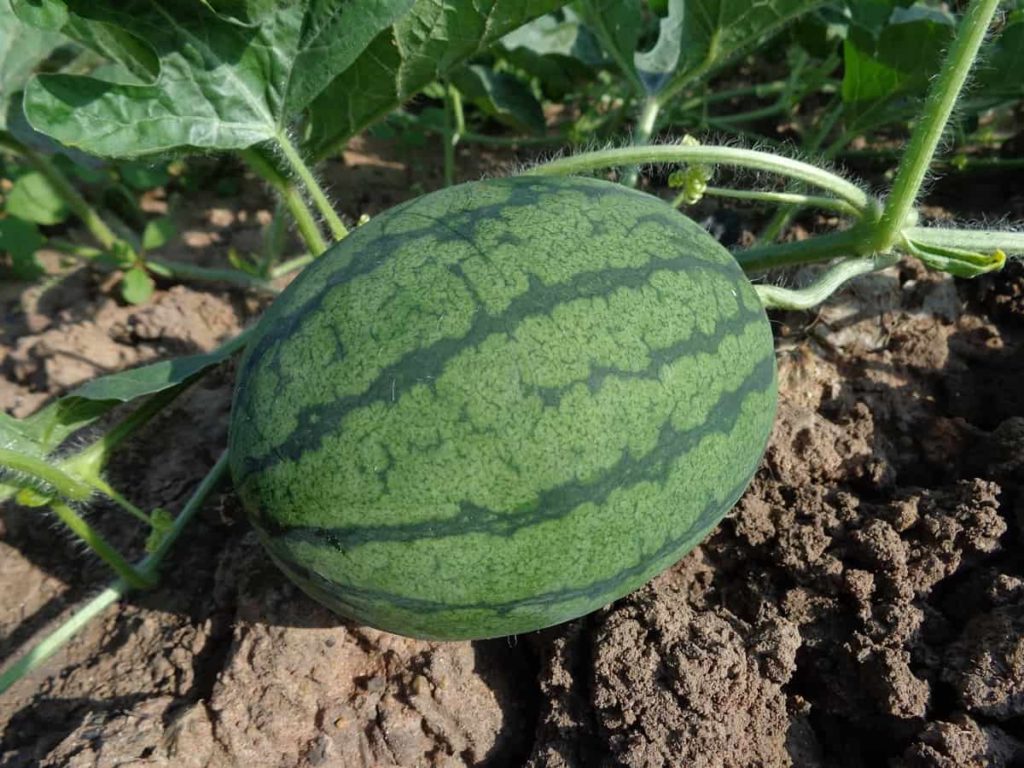
Organic fertilizers for Watermelon
Watermelons are heavy feeders, so they appreciate well-balanced compost and/or rich, homemade compost. When planting, you can apply small quantities of blood meal, bone meal, and greensand. In addition, you can use seaweed extract; it improves the growth, production, and quality of Watermelon.
Compost manure for Watermelon
Manure
Watermelons grow in various soils but prefer light, sandy, fertile loam sesame, easily eliminated. Add generous amounts of manure, compost, and leaves to your garden and work well on the soil before planting. Add a 2-to-3-inch level of manure to the length of the plantation area. Mix the fertilizer well in the planting point to create a balanced soil environment. Use only fresh livestock manure and avoid manure from meat-eating animals as this fertilizer can increase the chances of bacterial diseases.
Compost
Compost is an excellent addition to soil, especially if you plan to grow Watermelon. Since Watermelons like to grow in moist, fertile, and well-drained soil and compost, it will help keep your garden soil moist for a long time while also improving the soil structure. For better results, apply a 4-inch level of manure and mix it in the top 6 inches of soil.
Natural fertilizers for Watermelon
Mulch is also a good addition when planning to preserve moisture in the soil for a long time. Any mulch will help improve soil moisture retention capacity and prevent weed growth. The best mulch to apply for Watermelon is chopped newspapers, weed-free straw, and grass clippings.
In case you miss this: Watermelon Growing Tips, Tricks, Ideas, and Secrets
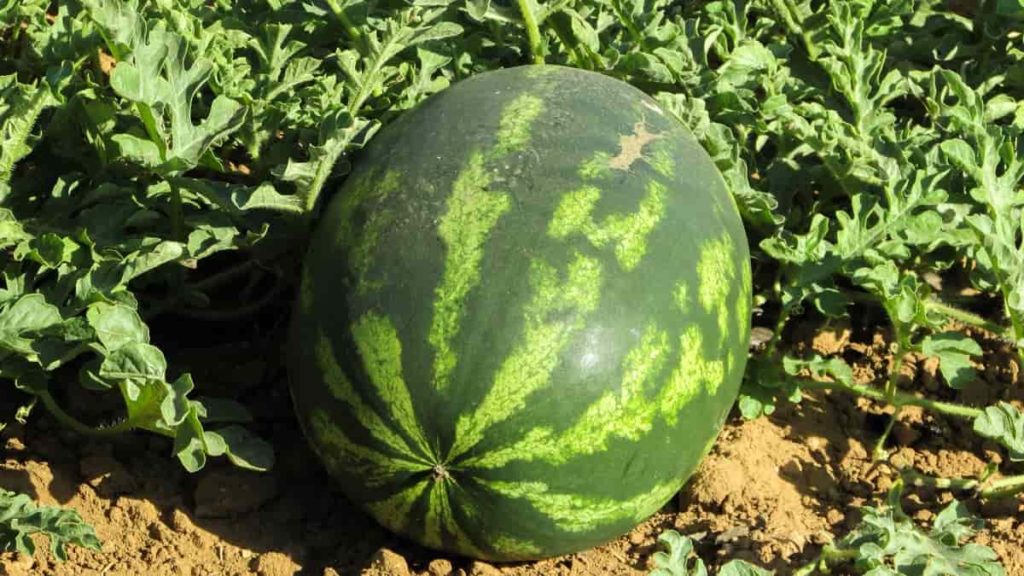
Commercial fertilizers for Watermelon
To grow Watermelon, you need to know that the Watermelon plant needs micronutrients and macronutrients. The primary macronutrients for Watermelon are NPK. If you apply more nitrogen fertilizer after melons are ready, the leaves may increase excessively rather than the growth of melons. Watermelon fertilizer ratio can be used to the plant’s entire life cycle 1-1-1, such as 10-10-10 or 14-14-14 NPK formulations.
Keep in mind to change to a more balanced ratio than high nitrogen when your melon is set. One of the most favorite things about Watermelon is its sweetness. An element called boron is known to help Watermelon sweeter. Boron for Watermelon helps in increasing fruit sweetness when given as a one tablespoon dose in 1 gallon of water. Spray this mixture based on leaves and plants.
Watermelon fertilizer schedule
Providing compost-rich soil at the beginning of planting will also ensure healthy vines and fruits. Fertilizer helps improve soil structure, adds micronutrients, and helps maintain water. It is the best idea to apply 5-10-10 fertilizer at 7 kg per 500 feet. To minimize possible nitrogen burning, mix the fertilizer well through the top 6 inches of soil. Before planting Watermelon seedlings, mix in the top 6 inches of soil to modify the soil with well-aged compost.
It would help if you fertilized Watermelon plants in 680 grams per 100 square feet. Once the seedlings emerge, top dress with a 5-5-5 or 10-10-10 all-purpose fertilizer. Do not let fertilizer sit in contact with leaves while fertilizing Watermelon with granule food. Instead, water the fertilizer well so that the roots can absorb nutrients easily. When leaves first emerge and once the plant’s flower, you can also apply liquid seaweed fertilizer. The balance nitrogen is given 30 to 35 days after planting.
You should use 33-0-0 fertilizer at 1/2 pounds per 50 feet. When the fruit has emerged, fertilize again. You can also side-dress vines with calcium nitrate at 907 grams per 100 feet or 34-0-0 fertilizer rate at 454 grams per 100 feet. Once the fruit has just appeared on the vine, side-dress again, stop using nitrogen-rich fertilizer after the fruits start to appear. When the fruit is maturing, an application of high phosphorus and potassium fertilizer can be applied.
In case you miss this: Growing Watermelon in Pots from Seeds – a Full Guide.
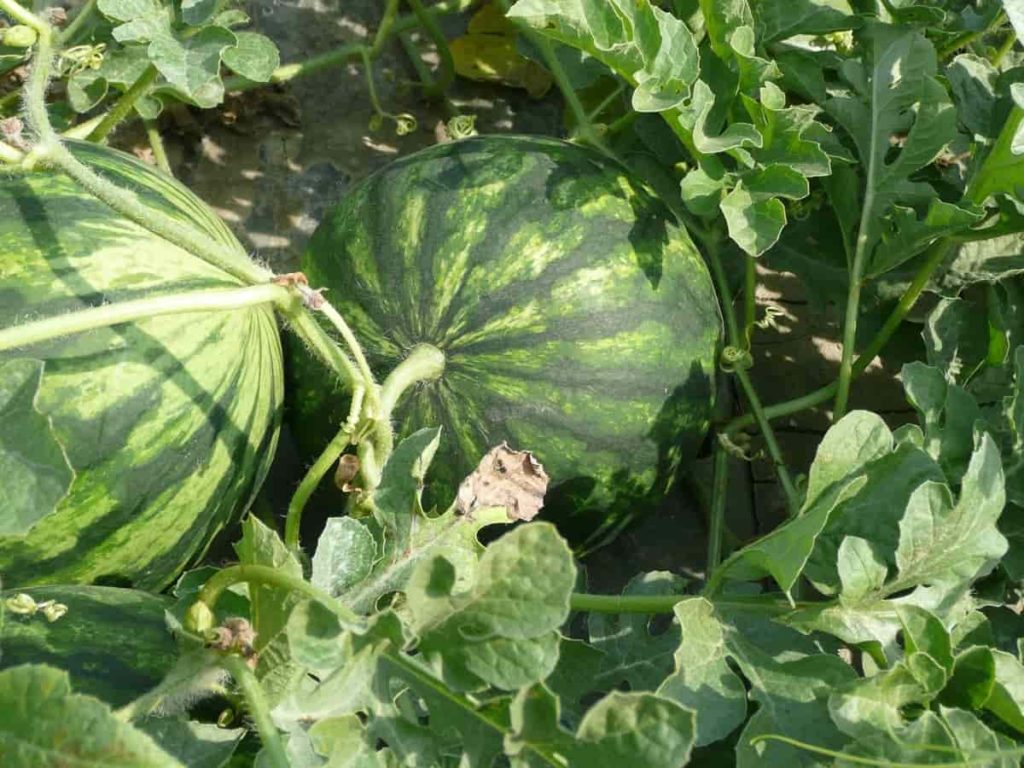
Fertilizing tips for increasing Watermelon yield
It is better to mix granular fertilizer in the upper 6 inches above the ground surface (like nitrogen) to minimize any chemical burning. Watering after fertilization is the most crucial step as it will help the roots absorb nutrients provided by fertilizer. Once the vines start producing fruit, avoid fertilizing with a nitrogen-rich fertilizer. Otherwise, your plant has more leaves and fewer fruits. Feed the plant food that contains boron to increase the sweetness of your Watermelon.
You can add directly by diluting it in water. This mixture can be applied to soil near the base of the plant or sprayed on leaves. You can prefer granular fertilizer for early feeding and then move to liquid fertilizer for the rest of the applications. Mix magnesium sulfate in the soil to improve fertility in the soil. If the leaves turn yellow in the middle of the growing season, apply liquid fertilizer like seaweed extract to fix them.
There is no fixed time for Watermelon crops, but if your soil testing indicates a lack of nutrients, you can add plant nutrition. Fertilizers can also be added based on the growing phase. Focus on feeding the female flowers to grow most Watermelons.
In case you miss this: Growing Watermelons Hydroponically- a Full Guide
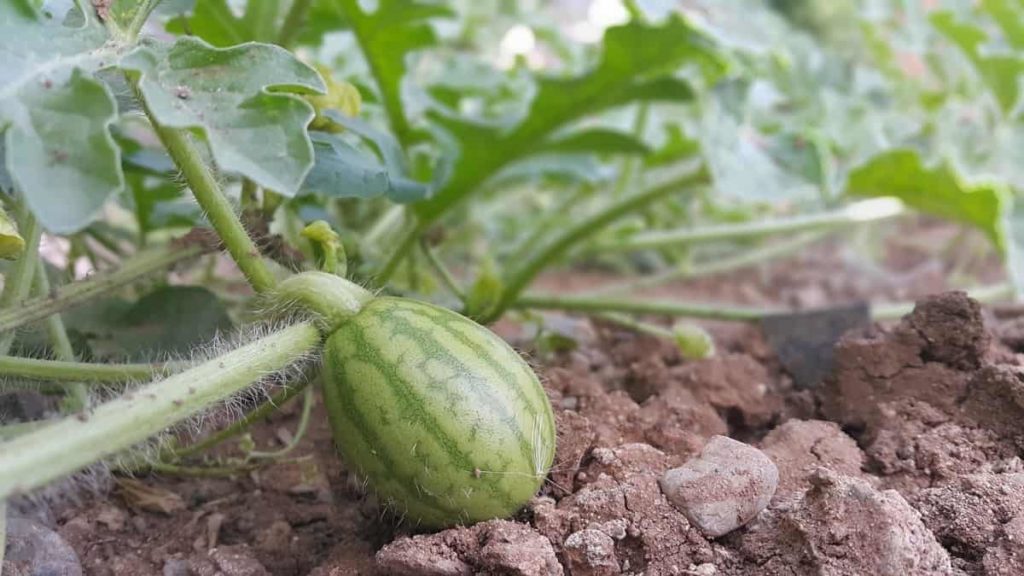
How to fertilize Watermelon in a pot
Watermelon is a heavy feeder, which means it requires a lot of nutrients that produce delicious melons. Therefore, fertilization of the Watermelon plant is adequate. When you know the stage of plant growth, plants have two stages of development in the outline of the Watermelon, including vegetative and generative phases. The vegetative phase is where a plant will focus on the growth of roots, new shoots, and stems.
At this stage, Watermelon plants will need more plant nutrients high in N, moderately P nutrients, small portions of nutrients S, Mg, and of course also micronutrients required by plants. Watermelon needs a lot of nutrients. Watermelon growing in containers depends on the nutrients you feed them growing. Fertilize your container of Watermelon once a week with a water-soluble fertilizer.
The water-soluble fertilizer will provide nutrients available immediately to help the plant grow. Fertilize Watermelon in the container every two to three weeks with a balanced fertilizer, fish emulsion, or kelp meal. Light top dressing of compost is also a good idea.
In case you miss this: How to Start a Backyard Garden from Scratch: ABeginner’ss Guide.
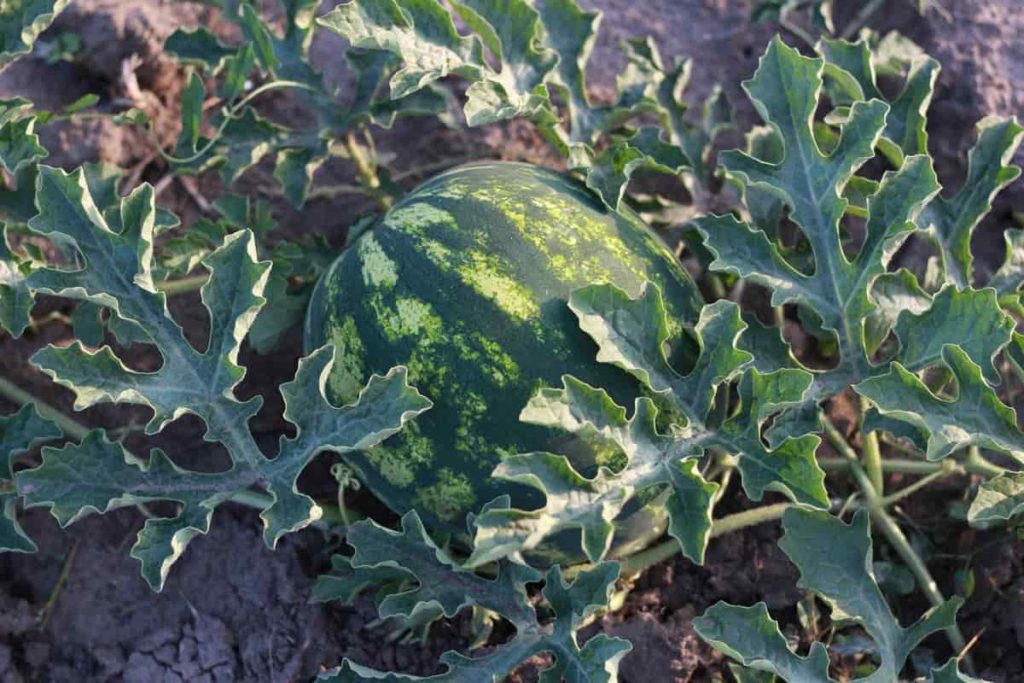
Frequently asked questions about fertilizers for Watermelon (FAQ)
Is calcium nitrate good for Watermelon?
Watermelon requires 453 grams of ammonium nitrate per 100 feet or 1 kg of calcium nitrate per 100 feet row. Feed nitrogen to your Watermelon before the vines start to run and after the fruit develops.
How do you grow large Watermelons?
To increase the size of Watermelons, regularly water the plant, deep-water sessions that keep the soil moist. Fertilizer boosts the growth to get large melons.
Why are my Watermelon plant leaves turning yellow?
Both young and old Watermelon leaves can show signs of nitrogen deficiency, and a shade of light green to yellow may appear. Both are common during dry spells and when plants are not being fed enough.
Why are my Watermelon plants growing so slow?
If you plant them in the wrong soil, Watermelon plants can grow more slowly. Heavy soil is the worst to grow Watermelon as it will result in plants producing tasteless melons and vines that grow slowly.
- How to Grow Tomatoes Organically at Home: A Comprehensive Guide
- Organic Gardening on a Budget: Low-Cost Methods and Materials
- Gongura Seed Germination and Planting Methods
- Cabbage Seed Germination and Selection
- Broccoli Seed Germination and Selection
- Asparagus Seed Germination and Variety Selection
- Seasonal Flower Gardening: Best Practices for Spring, Summer, Fall, and Winter
- How to Grow Hibiscus from Flower
- Plantation Ideas for Home Decoration: A Beginners Guide
- Flower Garden Designs and Layouts for Beginners
- Planting and Spacing Techniques in Papaya: A Beginner’s Guide
- Growing Gold: Essential Techniques for Planting Pineapples
- How to Make Kalanchoe Plant Bushy: Home Remedies and Solutions
- 11 Reasons Why Your Gardenia is Not Blooming: Home Remedies and Solutions
- Eco Elegance: The Guide to Designing a Drought-Tolerant Landscape
- Gardening on a Slope: Strategies for Hillside Landscaping
- Nourish and Flourish: Top Organic Mulches for Thriving House Plants
- Everything You Want to Know about Indian Mogra Flower: Discover Uses and Growing
- Green Thumb Success: Expert Tips for Cultivating Greenhouse Pumpkins All Year Round
- Maximize Growth & Flavor: The Ultimate Guide to Companion Planting in Herb Gardens
- How to Control Rhododendron Problems Naturally: Home Remedies and Organic Ways to Fix Them
- Natural Magic: The Remarkable Benefits of Cinnamon for Plants
- Best Steps to Revive Dying Tulip with Natural and Organic Treatment
- 10 Reasons Why Your Angel Trumpet is Not Blooming: Remedies and Treatment
- How to Fix Periwinkle Leaf and Flower-Related Problems: Natural Remedies and Solutions
- How to Fix Zinnias Leaf and Flower Problems: Discover Natural and Home Remedies
- Organic Steps to Induce Lemon Tree Flowers: A Comprehensive Guide
- Bloom Booster: Crafting the Perfect Homemade Bougainvillea Fertilizer
- Optimizing Growth: A Guide to Applying NPK Fertilizer for Potted Plants
- 10 Best Homemade Fertilizers for Rubber Plant: DIY Recipes and Application Method
- How to Boost Female Pumpkin Flowers: Effective Steps for More Flowers and High Yields
- Transform Your Indoor Garden: Top Benefits of Pink Salt for Houseplants
- 10 Best Homemade Fertilizers for Peacock Plants (Calathea): Easy DIY Guide
- Unlock Blooms: 9 Reasons Why Your Potted Chrysanthemum is Not Blooming
- 8 Reasons Why Your Potted Hibiscus is Not Blooming: Fix it with Simple Solutions
- Unlock Blooms: 9 Key Reasons Your Potted Frangipani Won’t Flower